First annual Critical Mineral Intelligence Centre conference takes place
The conference took place at BGS’s headquarters in Keyworth, Nottinghamshire, on 21 November 2023.
23/11/2023 By BGS Press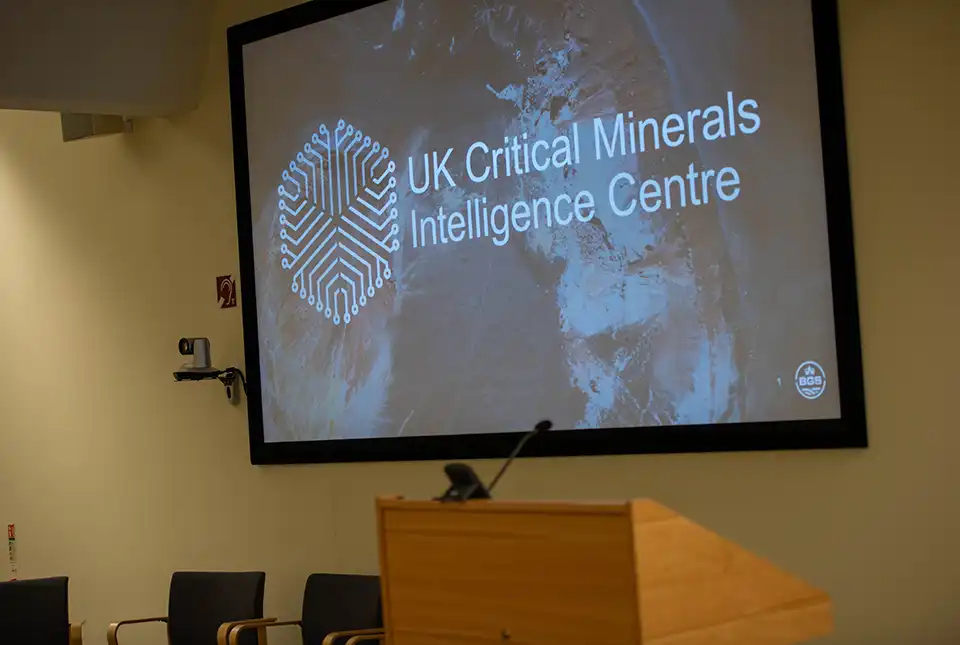
Led by BGS with support from the Department for Business and Trade (DBT), the Critical Minerals Intelligence Centre (CMIC) helps the UK to secure adequate, timely and sustainable supplies of the minerals and metals it requires to transition its economy to net zero emissions in the coming decades.
The conference set out the context and objectives of CMIC, the research and analyses it carries out, both in-house and commissioned from other bodies, and its engagement with UK Government and industry.
To open the conference, Nursrat Ghani MP, Minister of State at the Department for Business and Trade (DBT), provided a virtual opening address on the importance of critical minerals to the UK, highlighting that the country is committed to securing the supply of critical minerals. BGS Director Dr Karen Hanghøj then addressed the conference to talk about the role of BGS and its wider minerals research.
In hosting CMIC, BGS is able to build on its extensive expertise and knowledge, considerable international experience and ability to work with a broad range of research partners to give impartial advice to both Government and industry on reducing the risk of disruption to our critical mineral supply chains.
Dr Karen Hanghøj, BGS Director.
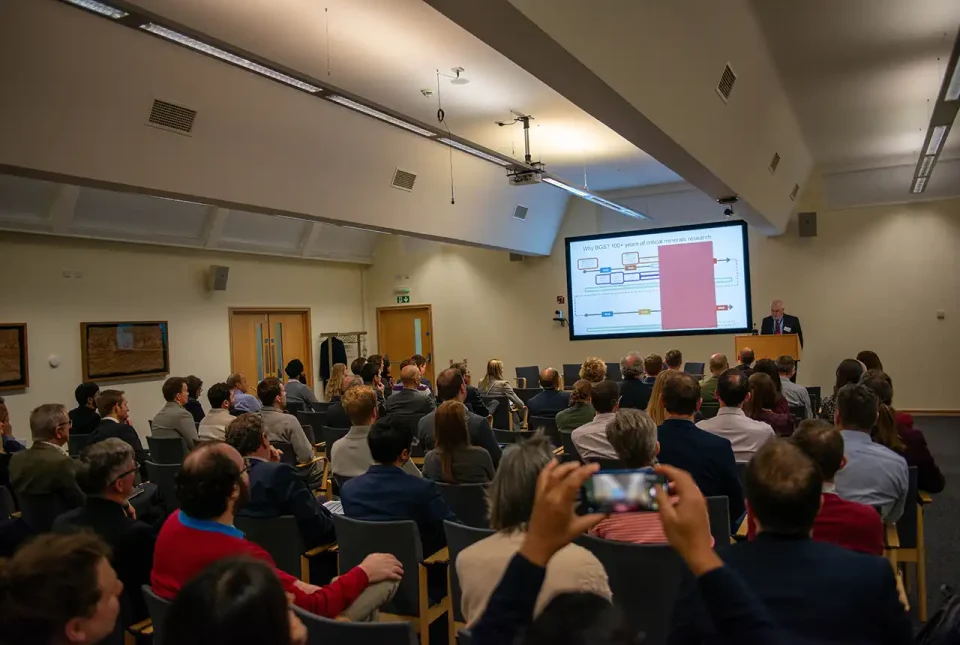
Andrew Bloodworth speaking during the CMIC conference. BGS © UKRI.
A number of other speakers also took to the floor at the conference, including Andrew Bloodworth, the interim CMIC Director, who took an in-depth look at the objectives, research, analysis and overview of the second year of the work programme.
At a time when the global economy is moving towards net zero and when geopolitical tensions have grown significantly, the information and insight provided by CMIC on possible risks associated with the UK’s critical mineral supply are important for informing decisions relating to our economic growth and national security.
Andrew Bloodworth, interim CMIC Director.
Dr Pierre Josso, deputy director at CMIC, then spoke about the updated methodology and the timescales for the next criticality assessment. There was also an expert panel discussion on the future direction of CMIC that featured:
- Karen Hanghøj, BGS Director
- Matt Hatfield, head of policy of critical minerals, Department of Business and Trade
- Emma Schofield, platinum group metals research fellow at Johnson Matthey
- Simon Thompson, BGS Board member
The panel discussed:
- future supply and demand for critical minerals
- long lead times for mining projects
- the role of CMIC in helping investors understand risk
- the likely nature of a more circular economy for critical minerals
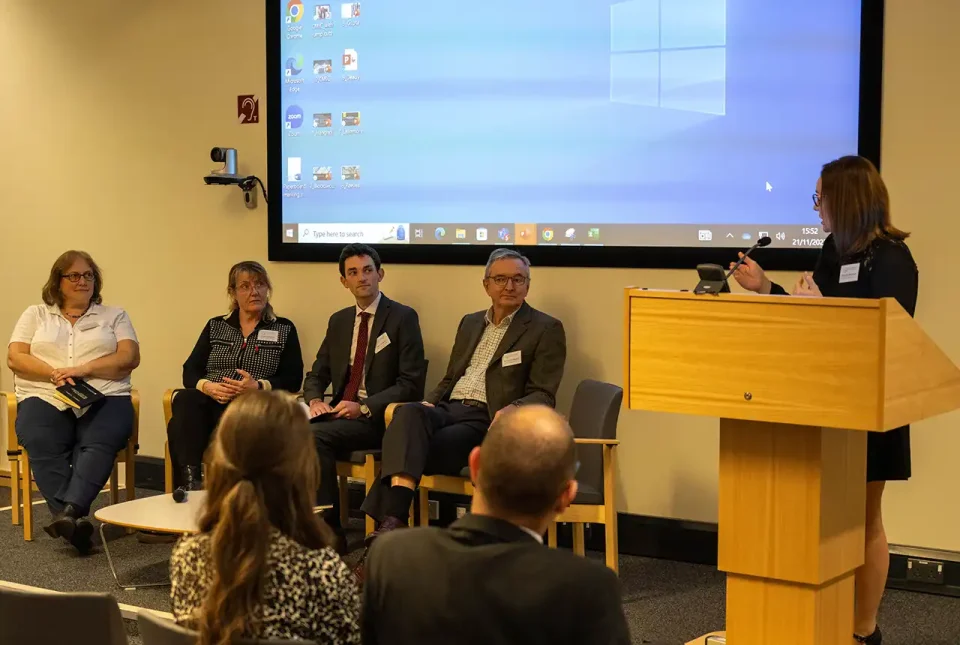
The panel discussion at the CMIC conference. Left to right: Emma Schofield, Karen Hanghøj, Matt Hatfield, Simon Thompson and Michelle Bentham. BGS © UKRI.
In addition to providing an opportunity for the delegates to comment and ask questions, the panel also highlighted the future priorities for CMIC, including focusing on UK manufacturing and a thorough analysis of supply chains.
Following the panel, there were closing reflections from Prof Julia Sutcliffe, Chief Scientific Advisor at DBT, who reinforced the Government’s commitment to securing the supply of critical minerals and the role that CMIC‘s strategy has played in getting us where we are today.
The UK Critical Minerals Intelligence Centre (CMIC) supports the UK in securing adequate, timely and sustainable supplies of the minerals and metals it requires to transition its economy in the coming decades to net zero emissions.
Led by BGS with support from the Department for Business and Trade (DBT), we work together with universities and private and public sector partners to gather and analyse intelligence on the supply and demand of critical minerals, their global value chains and use by UK industry. Our aim is to guide decision making by Government and industry to mitigate risks to supply security, helping to deliver economic prosperity and create opportunities for UK businesses in critical mineral supply chains, domestically and internationally.
The Department for Business and Trade (DBT) unifies what was the Department for International Trade and the business-facing parts of what was the Department for Business, Energy & Industrial Strategy (BEIS).
It brings sector, market and regulation experts together with world-class trade negotiators and business-support teams across the UK and overseas. This is to make the UK the best place to start and grow a company — helping create the business growth that contributes to better jobs and higher wages and living standards.
Relative topics
Related news
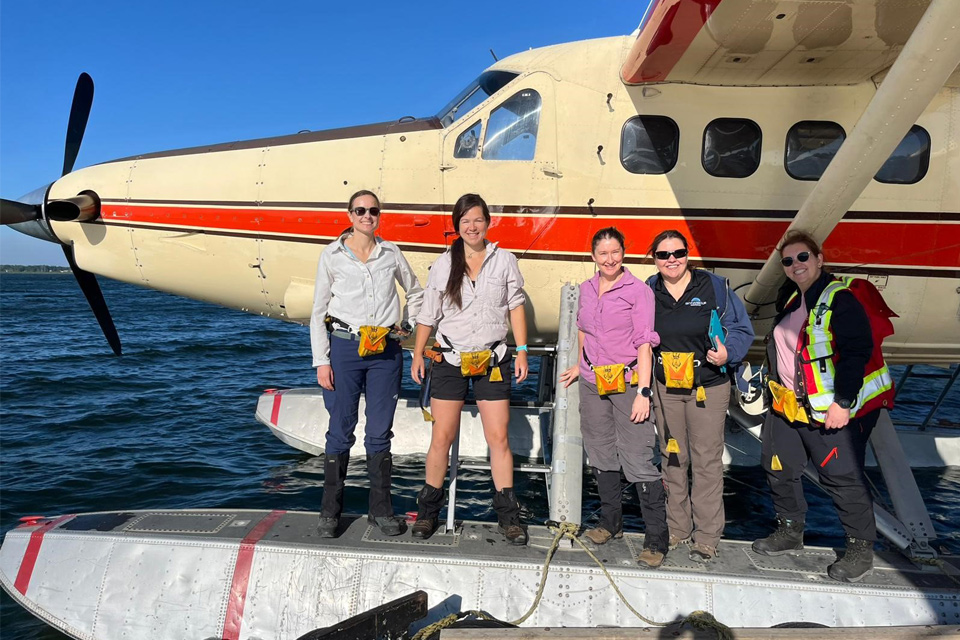
Funding awarded to UK/Canadian critical mineral research projects
08/07/2025
BGS is part of a groundbreaking science partnership aiming to improve critical minerals mining and supply chains.
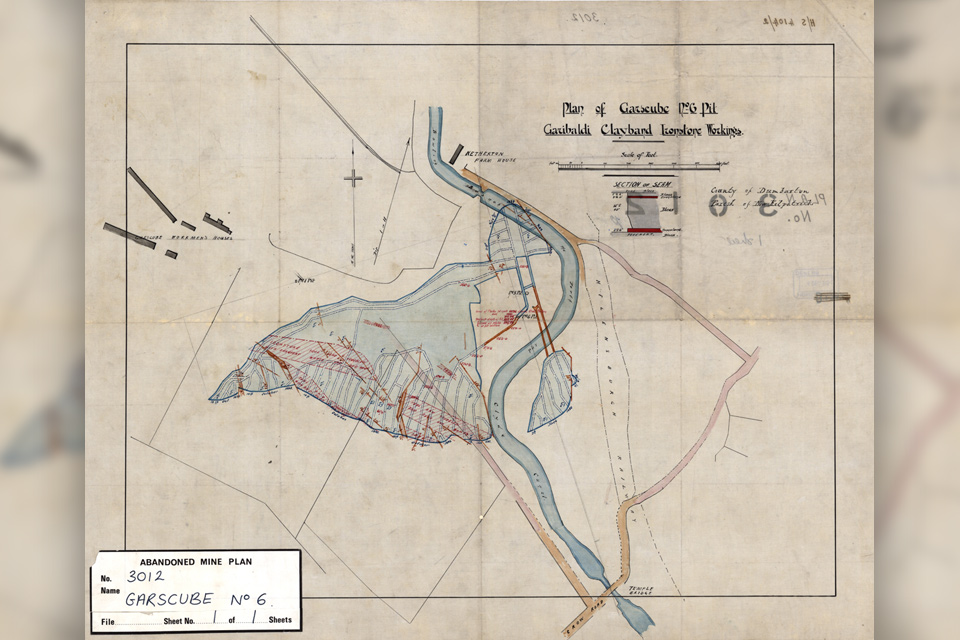
Release of over 500 Scottish abandoned-mine plans
24/06/2025
The historical plans cover non-coal mines that were abandoned pre-1980 and are available through BGS’s plans viewer.
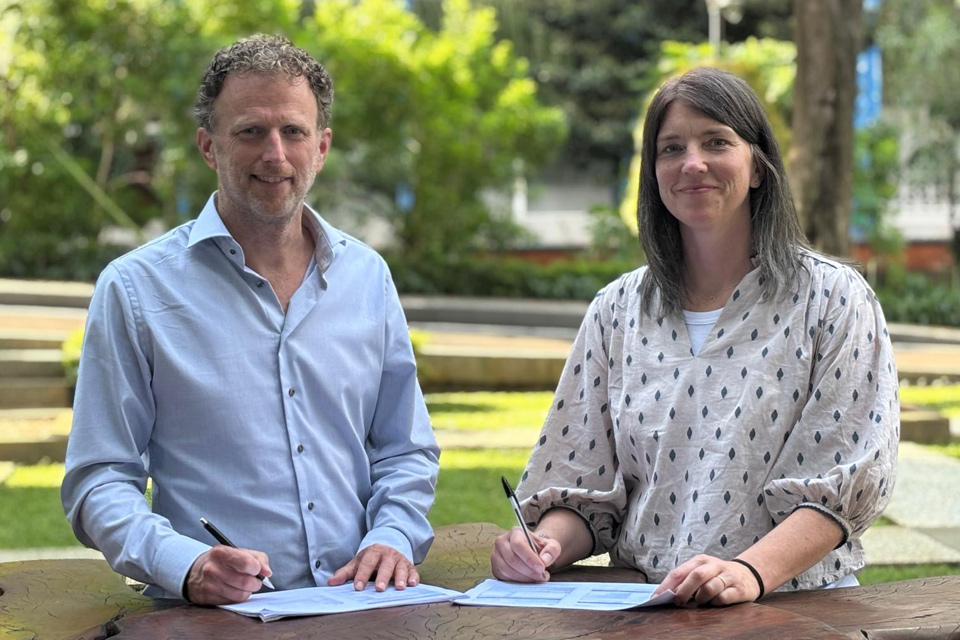
New collaboration aims to improve availability of real-time hazard impact data
19/06/2025
BGS has signed a memorandum of understanding with FloodTags to collaborate on the use of large language models to improve real-time monitoring of geological hazards and their impacts.

Modern pesticides found in UK rivers could pose risk to aquatic life
17/06/2025
New research shows that modern pesticides used in agriculture and veterinary medicines have been found for the first time in English rivers.

Goldilocks zones: ‘geological super regions’ set to drive annual £40 billion investment in jobs and economic growth
10/06/2025
Eight UK regions identified as ‘just right’ in terms of geological conditions to drive the country’s net zero energy ambitions.
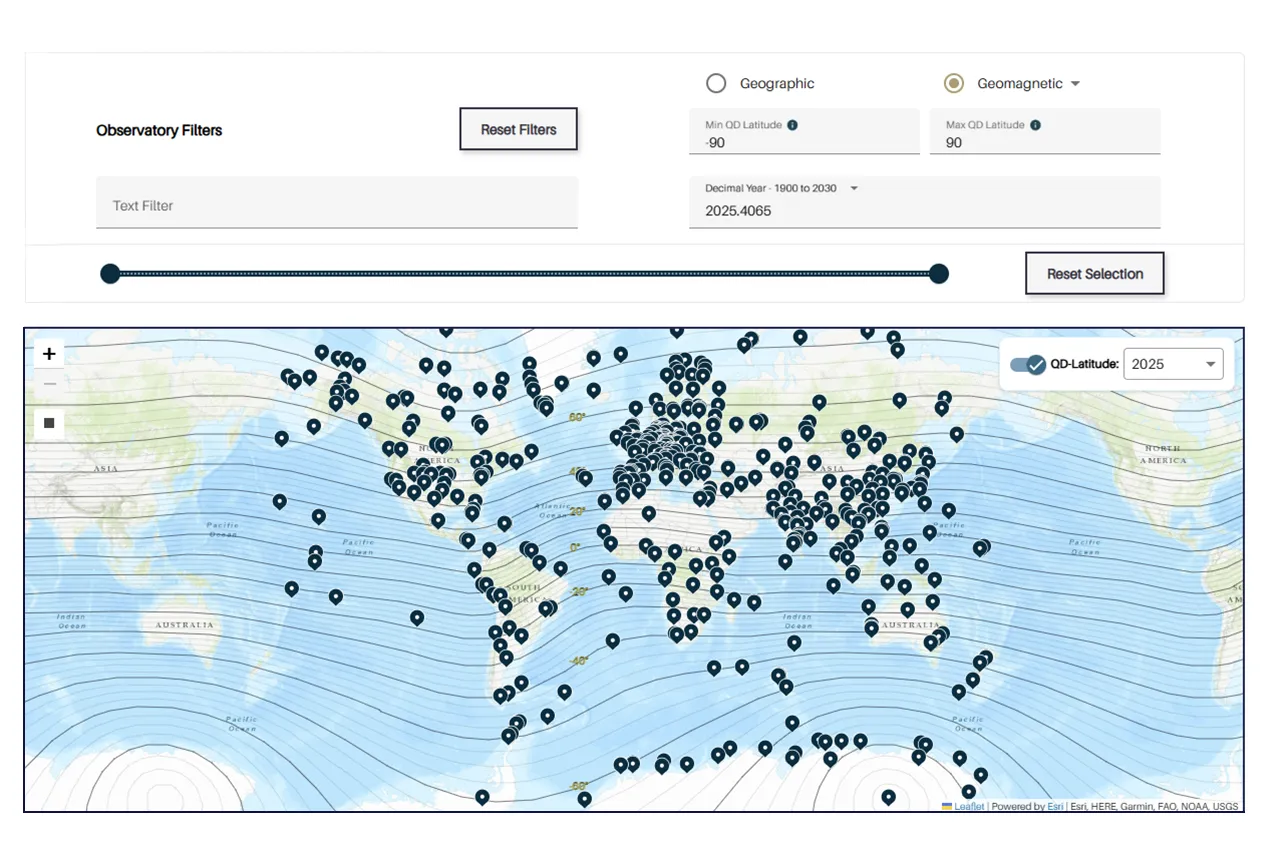
Upgraded web portal improves access to geomagnetism data
02/06/2025
BGS’s geomagnetism portal, which holds data for over 570 observatories across the world, has received a significant update.

BGS digital geology maps: we want your feedback
29/05/2025
BGS is asking for user feedback on its digital geological map datasets to improve data content and delivery.

What is the impact of drought on temperate soils?
22/05/2025
A new BGS review pulls together key information on the impact of drought on temperate soils and the further research needed to fully understand it.
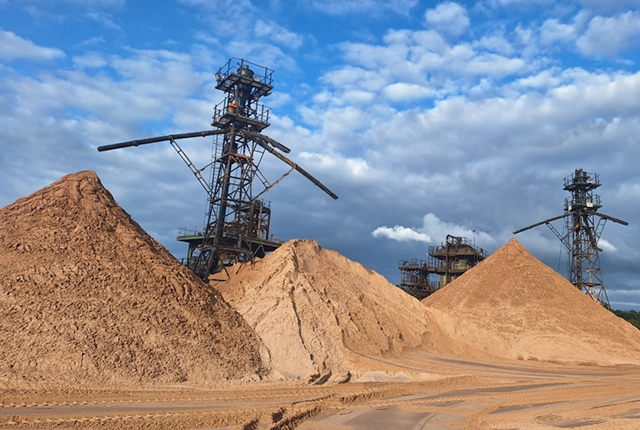
UK Minerals Yearbook 2024 released
21/05/2025
The annual publication provides essential information about the production, consumption and trade of UK minerals up to 2024.

BGS scientists join international expedition off the coast of New England
20/05/2025
Latest IODP research project investigates freshened water under the ocean floor.

New interactive map viewer reveals growing capacity and rare earth element content of UK wind farms
16/05/2025
BGS’s new tool highlights the development of wind energy installations over time, along with their magnet and rare earth content.

UKRI announce new Chair of the BGS Board
01/05/2025
Prof Paul Monks CB will step into the role later this year.




